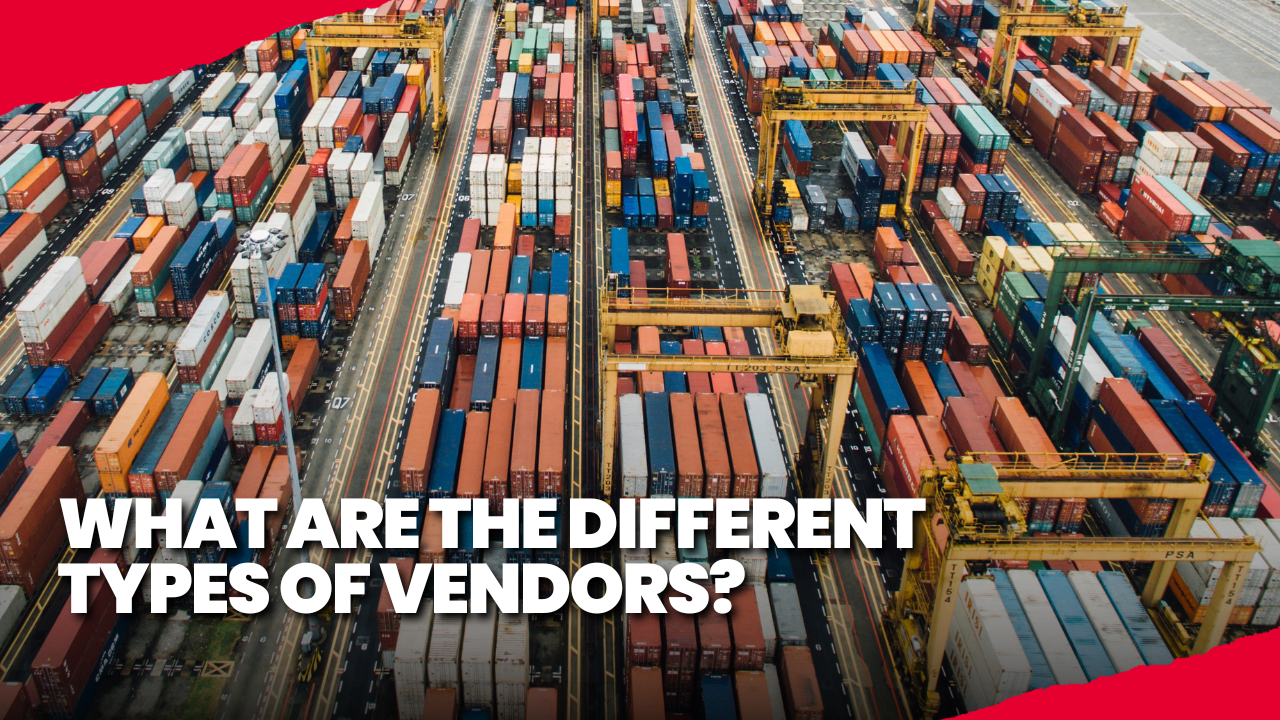
The supply chain depends on vendors to make sure that goods and services move smoothly between different businesses. Businesses of all sizes, from small shops to big companies, need to know what is vendor and how they work. Vendors are a significant aspect of any business because they give companies the goods and services they need to run smoothly or offer directly to customers. There are Different Types Of Vendors vendors, and this blog will explain each one and how they fit into the general operations of a business.
What Is a Vendor?
A vendor is a person or business that sells goods and services to customers or other companies. When vendors buy products from makers or distributors, they usually mark them up and sell them again, making a profit. The main objective of vendors is to maintain enough inventory to fulfill client demand while simultaneously keeping updated on trends to adjust their offerings properly.
Additionally, stores that sell directly to customers can be thought of as vendors in a wider sense. Vendors, on the other hand, are usually sellers who sell to other businesses.
What are the types of Vendors?
Different types of vendors, each with their own specific job, are an important part of the supply chain. Here are five types of vendors that you might see:
1. Manufacturers
A manufacturer takes raw materials and turns them into final products. They then sell these goods to stores or wholesalers. For example, a clothing manufacturer might make clothes and then distribute them to shops where people can buy them. The first person in the supply chain is the manufacturer. They make the products that will finally reach the market.
2. Wholesalers
Wholesalers buy a lot of goods from makers and then offer them at a lower price to stores. They act as middlemen between producers and retailers in this way. Wholesalers usually keep a lot of products and send them to smaller businesses. This way, the smaller businesses can keep their stock without having to deal directly with manufacturers.
3. Retailers
Retailers sell goods directly to customers, and to make a profit, they often raise the price of the goods. Depending on how they run their business, stores may get their goods from wholesalers or directly from manufacturers. Retailers can be anything from big chain stores to small, single personal shops.
4. Service and Maintenance Providers
For companies to run smoothly, service and maintenance providers provide major services. Services, like IT help, accounting, landscaping, and cleaning are some examples. These suppliers don’t supply the actual products, but they do the administrative work that keeps a business running.
5. Independent Vendors and Trade Show Representatives
Craft fair vendors and farmers’ market sellers are examples of independent vendors who deal directly with customers. Trade show representatives are also in this group; they show off goods at events and sell them directly to people who are there. Most of the time, these sellers offer unique or specific products that you might not be able to find in regular stores.
Also Read This: Difference Between Letter of Credit and Standby Letter of Credit
How Do Vendors Work?
The vendor’s process may be different depending on what part they play in the supply chain. However, here are the general steps that a seller takes:
Purchase Order
Buyers must first place a purchase order with the vendor. Purchase orders list goods and services, price, shipping, and delivery details. You can order by phone or online.
Delivery/Invoicing
The vendor delivers the goods or services after receiving the order. At delivery, an invoice lists the products or services, their quantities, and the total cost.
Payment and Review
The buyer verifies the provided goods or services. After checking the invoice and purchase order, the buyer pays. This step solves disagreements to maintain vendor relations.
Use/Resale
Finally, the buyer uses or sells the products. To make money, retailers buy things from vendors and mark them up.
Also Read This:
Why Are Vendors Important?
Businesses depend on vendors for both their own and their customers’ goods.
Successful supply chains require strong vendor relationships to maintain efficiency and competitive pricing.
Retailers often use many vendors to stock their stock of goods. Reliable vendors deliver items to fulfil consumer demand while lowering costs and improving inventory management.
Examples of Vendors
Take a few situations to understand what a vendor is:
Manufacturer-Vendor Example
Technology companies make smartphones. They sell phones to wholesalers, who sell them to retailers. Consumers buy phones from retailers, completing the supply chain.
Wholesaler-Vender Example
Food wholesalers buy bread and pastries from multiple suppliers. They wholesale these commodities to restaurants, cafés, and supermarkets.
Retailer Vendor Example
A retailer buys merchandise from wholesalers and manufacturers and sells it to customers at a markup in their stores and online.
Service Provider Example
Businesses run smoothly without major technical issues because of IT vendors’ software updates, system maintenance, and tech support.
Independent Vendor Example
Handcrafted jewelry is sold directly to clients at local markets and trade events by an individual maker.
Wrapping It Up
To sum up, in order to keep their supply chain running smoothly, organizations must have a clear understanding of what is a vendor and the many kinds of suppliers they work with. Businesses may optimize their processes, cut costs, and remain competitive by sustaining positive relationships with their vendors.
FAQs
Vendors supply goods and services to businesses and customers. They supply important assets to companies in the supply chain.
Yes, retailers are vendors, especially when they sell directly to customers. Most people use the term vendor to refer to commercial suppliers.
Strong vendor connections can improve price, delivery reliability, and operations, making your business more efficient and profitable.
Also Checkout Our YouTube Channel: @limeinstituteofexportimport






